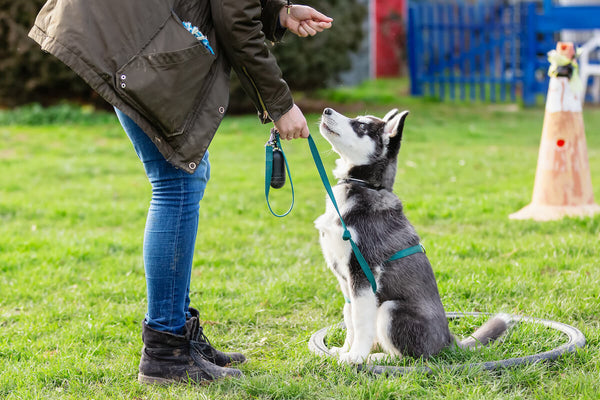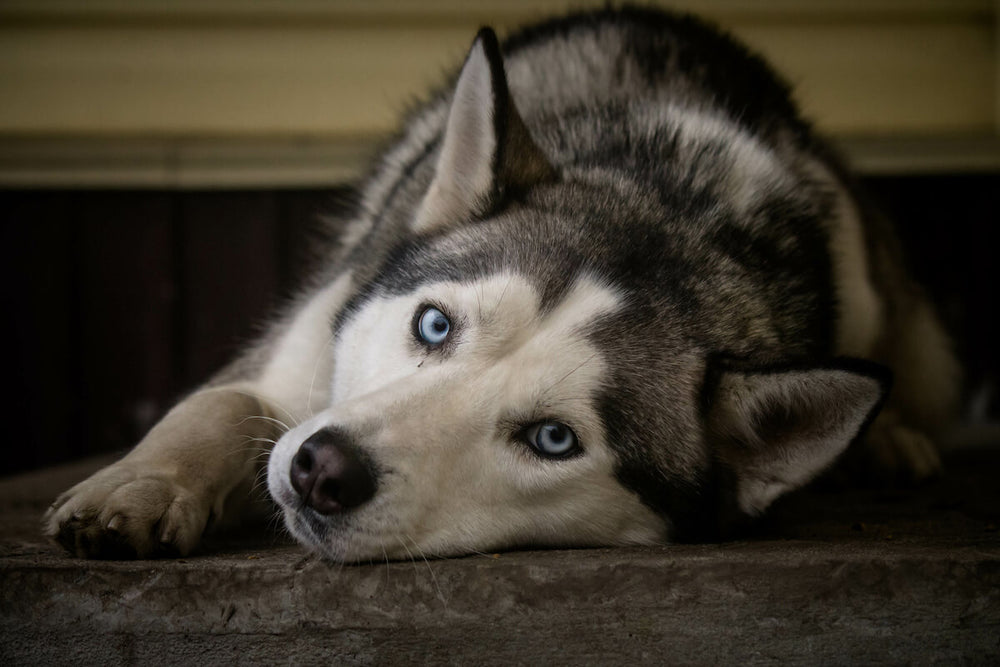With their piercing blue eyes and their wolf-like look, huskies make striking companions. But their appearance can be intimidating to some people, and it can leave others wondering if the dogs’ wild looks indicate a wild nature. Are huskies friendly dogs like our more docile-looking floppy-eared breeds, or are huskies aggressive?
Ultimately, any breed can be aggressive if they don’t get early socialization and proper training. Socialization is by far the most important factor for predicting a dog’s risk of developing aggressive behaviors. But, we can use history and data to determine if a dog breed is at a higher or lower risk of becoming aggressive compared to other dogs.
We’ll cover the risk of aggression in huskies, and explain the steps husky owners can take to prevent aggression in this breed. Here’s everything dog owners need to know about aggressive behavior before bringing home a husky.
Are Huskies Aggressive?

The best way to assess a dog breed’s risk of aggression is to look at whether it was bred for an aggressive job, whether it inherits health conditions that cause aggression, and how often it’s involved in dog bite incidents.
We’ll look at the husky’s history, health issues, and bite risk to find the answer to the question “Are huskies aggressive?”
Breed History
The Siberian husky was originally bred as a working dog, meant to pull sleds across the icy tundra. As a sled dog, huskies worked in packs and lived closely with other dogs. So, huskies tend to be sociable dogs. They often make great family pets and can get along well with small children and other dogs. Because they were bred to be around other dogs, huskies often enjoy socializing at dog parks and are at a low risk of showing aggression toward other dogs.
Unlike the German shepherd, pit bull, and rottweiler, for example, huskies were never bred to be guard dogs. According to the American Kennel Club (AKC), the husky’s watchdog and protective instincts are low, and the breed has a “what’s mine is yours” attitude. This puts them at lower risk for territorial aggression and resource aggression, which occur when a dog is guarding their home, toys, or food.
However, the Siberian husky is a high-energy dog. They love to run and chase. Even though husky dogs weren’t bred for hunting, they often have a high prey drive. Although huskies aren’t generally an aggressive dog breed, their high energy levels can lead them to chase smaller animals.
Health Issues
The most common health issues that cause aggression include hypothyroidism, cognitive dysfunction, brain tumors, epilepsy, and canine rage syndrome. So, are Siberian huskies prone to any of these conditions?
The Siberian husky is a relatively healthy dog and is not at an increased risk of developing any of these conditions. Hypothyroidism, however, is a relatively common condition that affects many medium and large sized dogs. It leads to a hormone imbalance in your dog’s thyroid, and left untreated, it can cause aggressive behavior.
If your typically sweet-tempered dog starts to show signs of aggression, take them to the vet to rule out an underlying health problem.
Bite Data
The American Veterinary Medical Association (AVMA) conducted a literature review that analyzed the data on dog bites and dog attacks. In it, they found that in certain regions of Canada where huskies are extremely common, they were also the breed most commonly involved in dog attacks.
But, the AVMA’s analysis attributes this to the prevalence of the breed rather than to a breed predisposition for aggression. Essentially, the more common a breed is, the more likely you are to get bit by that breed rather than another breed. However, that doesn’t necessarily mean the breed is inherently more aggressive.
The AVMA also found that as a breed becomes more popular, the number of reported bites for that breed goes up. This happened in the early ‘90s when the rottweiler’s popularity increased and, a few years later, bite reports for rottweilers also increased.
To understand whether the husky is more likely to bite than other dog breeds, we need to compare its popularity with its bite statistics. As nationwide data on dog bites by breed isn’t readily available, we'll look at a local example instead.
According to a local news report from Denver, Colorado, huskies ranked seventh for dog bites in the city. And, according to another local report, they’re also the seventh most popular breed in Denver. As we’d expect, the prevalence of bites follows how common the breed is in the city. They indicate that your risk of being bitten by an aggressive husky is no higher than your risk of being bitten by any other dog.
How Can You Prevent Husky Aggression?

Even though huskies aren’t predisposed to aggression, all dogs need proper training and socialization from an early age to get along with other animals and humans.
As an educated dog owner, you can help prevent and address aggressive behavior — keeping both their dog and the community safe. Here are the steps you can take to raise a well-adjusted husky:
Check for HOA or Apartment Breed Restrictions
Even though huskies aren’t prone to aggression, they’re banned by many apartment buildings. Typically, this is because the breed can be noisy and destructive if not properly trained. Check your housing restrictions before you bring home this breed to make sure you can provide a husky with a forever home.
Work With a Responsible Breeder
A responsible breeder will raise their husky puppies in their homes as beloved members of their family. They socialize them during the first stages of the puppies’ lives and they screen their adult dogs for possible health issues before breeding.
Start Socialization Early
The early socialization window is from birth to 12 weeks of a pup’s life, so start socializing your puppy as soon as you bring them home. From a young age, introduce them to as many different places, people, kids, and friendly animals as possible. Provide plenty of treats in new situations so your dog makes positive associations.
Sign Up for Dog Training
Find a dog trainer who specializes in positive reinforcement-based obedience training to help you address bad behavior and teach proper manners. Note that the Association of Professional Dog Trainers has found that old-fashioned dominance training can actually increase the risk of aggressive behavior in dogs.
Have Reasonable Expectations for Older Dogs
If you adopt an adult husky, you won’t know what their life was like with their previous owner. It’s possible they didn’t get enough training or socialization. An animal behaviorist can help you address behavioral problems, but you should expect progress to be slower when you socialize an adult dog.
Provide Plenty of Exercise
Huskies are high-energy dogs. If they don’t get enough exercise, they can become loud, destructive, and even aggressive. Help them release their pent-up energy with daily exercise in the form of long walks, runs, and trips to the dog park.
Provide Mental Stimulation
When you leave your husky puppy unattended, offer chew toys or treat puzzles to keep them busy and prevent them from becoming destructive in the house or bothering your other pets.
Learn to Recognize the Signs of Aggression
Fear, anxiety, and irritation can turn into aggression if dog owners don’t intervene. If your dog is showing signs of fear or aggression, like a tucked tail, pinned ears, raised hackles, crouching, barking, snarling, or lunging, remove your dog from the stressful situation. Take them to a quiet place, offer a calming chew, and wait for them to calm down before trying a different activity.
Snuggle Up to a Sled Dog

So, are huskies aggressive? Based on their history and current dog bite data, this breed doesn’t appear to be at a higher risk of aggressive behavior than your average dog.
Huskies are often friendly and reliable family dogs. Many huskies are good with kids and other dogs. But, training and socialization is more important than breed for determining husky behavior.
If you want to raise a well-adjusted husky puppy, you need to introduce them to different people early and often. Sign them up for dog training, provide plenty of physical and mental exercise, and learn to recognize the signs of fear and aggression so you can prevent problems before they start. If you have a particularly stressed-out husky, consider giving them regular calming chews to help reduce their anxiety.
For more information on your favorite breed’s health and behavior, check out the Native Pet blog.


